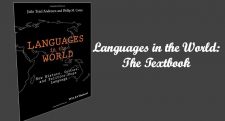Writing Across Languages – Try It!
Writing across languages is scary. Ruxie, one of my dear friends in Romania, shares two of my passions: linguistics and romance novels. About a month ago we went out to dinner, and she admitted she had written a Regency romance.
Note: a Regency is a novel set in early 19th-century England. Think Jane Austen’s time period.
I asked her if she would send it to me. She hemmed and hawed and was extremely reluctant because she wrote the story in English. She protested repeatedly, “But I’m not a native speaker.” Meaning her work would be substandard, and she’d be embarrassed by it. She didn’t want me to see her effort at writing across languages.
I insisted, and she finally agreed to send it. Of course, it took her a couple of weeks to screw up her courage. When I got it and took a look at it, I got the picture in pretty much the first couple of paragraphs.
Before I tell you what that picture is, I want to mention the wonderful article by Ana Menéndez “Are We Different People in Different Languages?” that appeared in Literary Hub November 2015.

Ana Menéndez
She opens with the anecdote of a young man from Latvia who was in one of her writing classes at a university in the Netherlands. The students had an assignment to translate a story written in English into their native language – writing across languages. The student from Latvia was having trouble with it. Finally, he came to her and said he couldn’t do it, explaining that the story was very dark, while Latvian is a very sweet and beautiful language.
“A sweet and beautiful language,” Menéndez writes. “I smiled. And then gently broke it to him that it’s not the language that was sweet and beautiful; it was the 10-year-old boy who stopped using it exclusively when he acquired a new one.”
Back to Ruxie’s Regency romance. It was pitch perfect.
Last night she and I got together for another dinner and a chance to discuss her work. And, in the meantime, I had sent her the link to Menéndez’s article, and we discussed that, too. I told her, “You may not be a native speaker of English, but you can put that behind you. You’re obviously a native speaker of romance.”
Like the young man who had the associations of his childhood experiences with Latvian, so Ruxie has the associations of her experiences as a reader of Regency romances written in English. Neither of them needs to fully inhabit a language in order to make good use of it.
The Russian-American linguist Roman Jakobson is famous for having said:

He’s right. If I am referring to ‘a friend’ in French, I don’t have a choice whether or not to identify this particular friend by his or her gender. It’s either un ami or une amie, and there you are. English lets you slide by that distinction, although you may specify whether you’re talking about a male or female friend, if you so choose. However, we don’t have a choice when it comes to third person singular pronouns. Either he did something or she did. Many languages have a generic third person singular pronoun and don’t have to make a gender distinction.
Just as languages have different grammatical requirements, they also afford different expressive possibilities, and I would go so far to say Ruxie couldn’t have written her story in any language other than English. In fact, she said as much, because as a professional translator, she says that it’s difficult – if not impossible – to properly translate a romance novel into Romanian because there isn’t the available allusive vocabulary in Romanian that has been worked out in English over the centuries – and romance is, indeed, a venerable narrative form extending back to the 12th century. Or else those possibilities always existed in English and writers developed a narrative form in which to exploit them.
More to the point is that English and Romanian blend in Ruxie’s life in their own unique ways, just as do the various languages Menéndez’s students speak and write in. Writing in English has enriched Ruxie’s writing life, just as writing in a childhood language enriches that of a person who has moved to a new country and is living life through a new language.
Menéndez notes that monolingual writers have much to learn from the multilingual experience, “one that will invite them to confront, perhaps for the first time, the gulf between a lively mind and a poor tongue.”
I can attest to the frustrations and the challenges and even the joys of confronting the gulf between my active mind and poor tongue. When I learn a new language, I love to test the limits of new grammatical skills in writing because I hit those limits so quickly when trying to compose the simplest string of sentences.
You might be curious to see the results of some of my efforts at writing across languages in French, German, Romanian and Vietnamese on my essays page.
For more tips on writing a novel, visit my complete guide on writing a book.
Categorised in: Language, Writing, Writing Inspiration, Writing Tips
This post was written by Julie Tetel Andresen
You may also like these stories:
- google+
- comment



